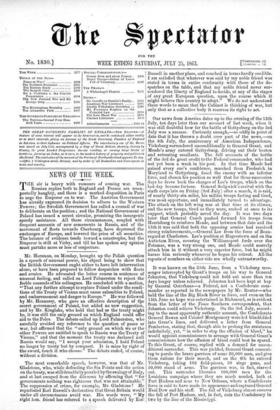It was known on the 25th June, from a Vicksburg
mes- senger intercepted by Grant's troops on his way to General Johnston, that Vicksburg could not hold out more than ten days longer unless relieved. Johnston had been kept at bay by General Osterhaus—a Federal, not a Confederate com- mander as reported in the newspapers by Mr. Reuter—who held the line of the Big Black River in force, and even on the 15th June no hope was entertained in Richmond, as is evident from the letter of the Times Southern correspondent, that Johnston could relieve Vicksburg. On the 3rd July, accord- ing to the most apparently authentic account, the Confederate General Bowen and Colonel Montgomery were led blindfolded into Grant's lines, and delivered a letter from General Pemberton, stating that, though able to prolong the resistance indefinitely, yet, "in order to stop the effusion of blood," he would appoint commissioners to arrange with General Grant's commissioners how the effusion of blood could best be spared. To this Grant, of course, replied with a demand for uncon- ditional surrender. This was yielded, General Grant consent- ing to parole the brave garrison of some 20,000 men, and give them rations for their march, and on the 4th he, entered Vicksburg, taking 102 field-pieces, 30 siege guns, and 50,000 stand of arms. The garrison was, in fact, starved out. This surrender liberates 100,000 men for the Louisiana campaign where they are much needed, both at Port Hudson and near to New Orleans, where a Confederate force is said to have made its appearance and captured General Neal Dow and his staff. The fall of Vicksburg almost ensures the fall of Port Hudson, and, in fact, cuts the Confederacy in two by the line of the Mississippi.






























